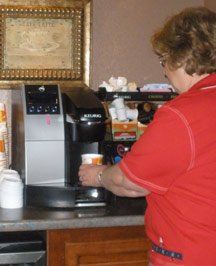SANGER—At Ridin’ for the Brand Cowboy Church, Pastor Jack Blease tells visitors, “You can wear your boots and jeans,” and the morning prayer ends with an “Amen” and a “Yeee-haw!”
Located in the Wagon Master RV Park Dance Hall, Ridin’ for the Brand Cowboy Church ministers to full-time cowboys, part-time ropers and team sorters, horse and cattle owners, and Western culture fans. “It’s a little bit of everybody,” Blease acknowledged.
Blease and his wife, Ruscella, started the church in response to the need among many Texas cowboys for a comfortable place to worship that appeals to the Western-heritage culture. The Bleases had been ministering to cowboys on the road for several years and were searching for a church of their own when they decided to start a cowboy congregation near their home in Krum.
The project couldn’t have been possible without the help of Ron Nolen, coordinator for the Texas Fellow-ship of Cowboy Churches, and Charles Higgs, the Baptist General Convention of Texas’ director of western heritage ministries, Mrs. Blease said.
The BGCT recently launched Texas Hope 2010, an initiative that calls Texas Christians to give every person in the state an opportunity to respond to the gospel of Christ in his or her own language and cultural context.
|
Pastor Jack Blease and the Buckarette Chorale lead Sunday morning worship in the Wagon Master RV Park Dance Hall.
|
With a specific mission to reach “people who are more at home in a saddle than in a pew,” Ridin’ for the Brand helps spread God’s hope to Texans invested in Western culture.
“For many of these people, all the trappings of a traditional church just didn’t work for them,” Blease said.
After a meeting to investigate interest in such a ministry in fall 2007, Ridin’ for the Brand held its first service Dec. 9 with 13 in the congregation. Now, an average Sunday draws more than 100 people, and often visitors make up as much as half the attendance.
“We’re attracting so many people who haven’t been to church in a long time,” the pastor’s wife observed.
“It’s just awesome. That’s our mission.”
Church member Eddie Flemister agreed. “A lot of times, (cowboys) wouldn’t go to a conventional church,” Flemister said. He and his wife, Tammie, help with the children’s ministry at Ridin’ for the Brand on Sunday mornings. They’ve been attending the church since Jan. 1, after the pastor stopped by to compliment the Flemisters’ lawn decor.
“We have a life-sized praying cowboy (figure) in our front yard,” Flemister explained. “Pastor Jack stopped to say he appreciated our testimony.”
Musician and worship leader Dan Johnson said the church attracted him because he likes “small churches and friendly folk.”
Ridin’ for the Brand Cowboy Church members make welcome and accessibility top priorities as they reach out to the Western-heritage community. Cowboy stories, ballads and Western terminology help Blease and his church create a familiar atmosphere for people devoted to Western heritage.

Tammie Flemister helps with Ridin’ for the Brand’s children’s ministry, providing snacks and activities during the Sunday sermon.
|
Instead of creating prayer teams and evangelism committees, Ridin’ for the Brand invites its members to join the “picket line” to pray for the church or get involved with the newly created “great round-up team” to spread the word about Ridin’ for the Brand.
Prayer, evangelism and small-group study are key to the church. During each Sunday service, about 15 minutes are devoted to talking about and praying over people’s blessings and burdens. It’s Blease’s favorite time of the morning, he said.
Discussing evangelism, Blease acknowledged many people feel nervous to talk about Jesus.
“If you’re shy about talking about Jesus, talk about your church,” he encouraged in a church business meeting.
“That’s evangelism—that’s reaching out.”
Many Christian cowboys choose to pursue their faith independent of a church. Worshipping in community can seem to threaten privacy; some feel judged within the organized church and feel pressure to conform to a suburban culture that’s not their own. Others choose not to attend simply because of inconvenience.
“Lots of people love Jesus but don’t think they need that public worship,” Blease said. “And they do.”
Through Ridin’ for the Brand’s small-group ministry, Blease hopes to disarm skeptics and invite them into a comfortable experience of Christian community. Members of Ridin’ for the Brand don’t have Sunday school classes, but instead are prompted to join a men’s or women’s small-group Bible study. These groups meet in members’ homes throughout the week.
“In that setting, people are freer to ask questions,” Blease explained, saying trust levels are built among the congregation through focused, intimate community.
“It’s much more interactive,” he said.
Soon, a coed study also will be offered, and Blease hopes to see a youth ministry develop as the church continues to grow.
As relationships deepen among members, the church’s mission remains to reach out to the unchurched cowboy community.
“Fifteen percent of Texans … make their living (in) Western culture,” Blease said.
“Then you’ve got your ‘weekend cowboys,’ who sort and rope calves and such, … and there’s this whole other group of ‘windshield cowboys’ who watch Western movies. Add them together—you’re talkin’ about a lot of people in the state of Texas, and lots of them are lost.”




